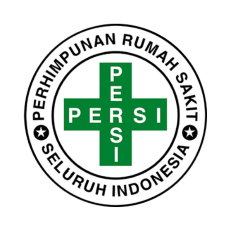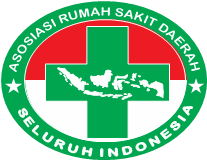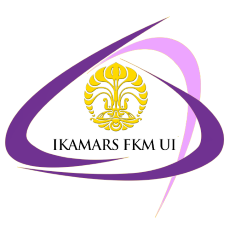Abstract
Electronic Medical Records (EMR) have emerged as an innovative solution in healthcare because EMR offers several advantages and provides a comprehensive solution to improve health information management in today’s digital era. This study applies the Technology Acceptance Model (TAM) as its theoretical foundation, aiming to evaluate the relationship between user perceptions of key factors influencing EMR implementation and service efficiency in the Kebayoran Lama Regional Hospital outpatient unit. The research design is non-experimental with a quantitative approach, utilizing numerical data analyzed through Structural Equation Modeling (SEM). The study collected data on user perceptions regarding EMR implementation and service efficiency through questionnaires filled out by 72 users as respondents, interviews with four stakeholders, and document reviews related to EMR implementation. Findings indicated significant relationships between the perceived usefulness of EMR and motivation, motivation and EMR implementation, and EMR implementation and service efficiency. These findings offer valuable insights for developing more effective EMR implementation strategies. Management can apply a fair reward and punishment mechanism, offering incentives for users consistently utilizing EMR and sanctions, such as reduced honoraria, for non-compliant users. Additionally, regular training tailored to individual needs, particularly for specialists, can improve comfort and proficiency in EMR use. Direct, responsive management support for user challenges can further boost motivation. Routine evaluations and active user involvement in feedback processes strengthen their sense of ownership toward the system, increasing motivation and commitment to EMR use.
References
Aldosari, B. et al. (2017) ‘Assessment of factors influencing nurses acceptance of electronic medical record in a Saudi Arabia hospital’, Informatics in Medicine Unlocked, 10. Available at: https://doi.org/10.1016/j.imu.2017.12.007.
Almarzouqi, A., Aburayya, A. and Salloum, S.A. (2022a) ‘Determinants predicting the electronic medical record adoption in healthcare: A SEM-Artificial Neural Network approach’, PLOS ONE. Edited by A. Haldorai, 17(8), p. e0272735. Available at: https://doi.org/10.1371/journal.pone.0272735.
Almarzouqi, A., Aburayya, A. and Salloum, S.A. (2022b) ‘Determinants predicting the electronic medical record adoption in healthcare: A SEM-Artificial Neural Network approach’, PLOS ONE, 17(8), p. e0272735. Available at: https://doi.org/10.1371/journal.pone.0272735.
Aqleh, M.M. et al. (2019) ‘Acceptance and Usability of Medical Informatics Among Physicians in Bahrain’, in Proceedings of the 11th International Conference on e-Health 2019. International Conference on e-Health 2019, IADIS Press, pp. 51–58. Available at: https://doi.org/10.33965/eh2019_201910L007.
Asyfia, A. et al. (2023) ‘Medical Record Digitization Policy: Overview of the Health Minister Regulation Number 24 of 2022’, Consilium Sanitatis: Journal of Health Science and Policy, 1(2), pp. 54–61. Available at: https://doi.org/10.56855/jhsp.v1i2.227.
Burhan, L. and Nadjib, M. (2023) ‘Hubungan Persepsi Pengguna Terhadap Keberhasilan Implementasi Rekam Medis Elektronik ; Tinjauan Literatur’, Jurnal Kesehatan Tambusai, 4(2), pp. 1532–1545. Available at: https://doi.org/10.31004/jkt.v4i2.15536.
Campanella, P. et al. (2016) ‘The impact of electronic health records on healthcare quality: a systematic review and meta-analysis’, European Journal of Public Health, 26(1), pp. 60–64. Available at: https://doi.org/10.1093/eurpub/ckv122.
Direktorat Pelayanan Kesehatan Rujukan (2020) ‘LAKIP 2020 Direktorat Pelayanan Kesehatan Rujukan’.
Fraser, H.S.F. et al. (2022) ‘User Perceptions and Use of an Enhanced Electronic Health Record in Rwanda With and Without Clinical Alerts: Cross-sectional Survey’, JMIR Medical Informatics, 10(5), p. e32305. Available at: https://doi.org/10.2196/32305.
Ghozali, I. (2016) Aplikasi Analisis Multivariete SPSS 23.
Gomer, S., Hasyim and Kusumapradja, R. (2020) ‘Acceptance Model of Hospital Information Management System: Case of Study in Indonesia’, European Journal of Business and Management Research, 5(5). Available at: https://doi.org/10.24018/ejbmr.2020.5.5.505.
Hair, J.F. et al. (2019) ‘When to use and how to report the results of PLS-SEM’, European Business Review, 31(1), pp. 2–24. Available at: https://doi.org/10.1108/EBR-11-2018-0203.
Honavar, Santosh G (2020) ‘Electronic medical records – The good, the bad and the ugly’, Indian Journal of Ophthalmology, 68(3), pp. 417–418. Available at: https://doi.org/10.4103/ijo.IJO_278_20.
Honavar, Santosh G. (2020) ‘Electronic medical records – The good, the bad and the ugly’, Indian Journal of Ophthalmology, 68(3), p. 417. Available at: https://doi.org/10.4103/ijo.IJO_278_20.
Ibrahim, A. et al. (2018) Metodologi Penelitian. Available at: http://repositori.uin-alauddin.ac.id/12366/1/BUKU%20METODOLOGI.pdf (Accessed: 24 September 2023).
KEMENKES RI (2023) Kemenkes Resmi Luncurkan Rekam Medis Elektronik Terintegrasi SATUSEHAT. Available at: https://kemkes.go.id/id/rilis-kesehatan/kemenkes-resmi-luncurkan-rekam-medis-elektronik-terintegrasi-satusehat (Accessed: 27 October 2024).
Keshvari, M. et al. (2018) ‘Barriers for the Using of Information Systems in Hospitals: A Qualitative Study’, Shiraz E-Medical Journal, 19(8). Available at: https://doi.org/10.5812/semj.66180.
Mahendra, I. (2016) ‘Penggunaan Technology Acceptance Model (tam) Dalam Mengevaluasi Penerimaan Pengguna Terhadap Sistem Informasi Pada Pt.ari Jakarta’, Jurnal Sistem Informasi, 5(2), pp. 183–195. Available at: https://doi.org/10.51998/jsi.v5i2.105.
Martin, T. (2022) ‘A Literature Review on The Technology Acceptance Model’, International Journal of Academic Research in Business and Social Sciences, 12(11), p. Pages 2859-2884. Available at: https://doi.org/10.6007/IJARBSS/v12-i11/14115.
Rabbani, A. (2023) ‘E-Health Sebagai Informasi Pengetahuan Ibu Terhadap Kesehatan Anak Berdasarkan Standar WHO (World Health Organization)’, ULIL ALBAB : Jurnal Ilmiah Multidisiplin, 2(7), pp. 2956–2965. Available at: https://doi.org/10.56799/jim.v2i7.1783.
Rahi, S., Abd. Ghani, M. and Mi Alnaser, F. (2017) ‘Predicting customer’s intentions to use internet banking: the role of technology acceptance model (TAM) in e-banking’, Management Science Letters, pp. 513–524. Available at: https://doi.org/10.5267/j.msl.2017.8.004.
Rohman, A.N., Mukhsin, M. and Ganika, G. (2023) ‘Penggunaan Technology Acceptance Model Dalam Analisis Actual Use Penggunaan E – Commerce Tokopedia Indonesia’, Jurnal Ekonomi Manajemen Akuntansi Keuangan Bisnis Digital, 2(1), pp. 25–36. Available at: https://doi.org/10.58222/jemakbd.v2i1.150.
Shrestha, N. (2020) ‘Detecting Multicollinearity in Regression Analysis’, American Journal of Applied Mathematics and Statistics, 8, pp. 39–42. Available at: https://doi.org/10.12691/ajams-8-2-1.
Sugiyono (2012) Metode Penelitian Kuantitatif Kualitatif Dan R&d.
Sugiyono (2013) E-Book Metode Penelitian Kuantitatif, Kualitatif, dan RD. Alfabeta. Available at: //elibrary.stikesghsby.ac.id%2Findex.php%3Fp%3Dshow_detail%26id%3D1879%26keywords%3D (Accessed: 24 September 2023).
Syam, S. (2020) ‘Pengaruh Efektifitas Dan Efisiensi Kerja Terhadap Kinerja Pegawai Pada Kantor Kecamatan Banggae Timur’, Jurnal Ilmu Manajemen Profitability, 4(2), pp. 128–152. Available at: https://doi.org/10.26618/profitability.v4i2.3781.
Tiorentap, D.R.A. (2020) ‘Manfaat Penerapan Rekam Medis Elektronik Di Negara Berkembang: Systematic Literature Review’.
Werder, M. (2015) ‘Health information technology: A key ingredient of the patient experience’, Patient Experience Journal, 2(1), pp. 143–147. Available at: https://doi.org/10.35680/2372-0247.1071.
Wibowo, A. (2021) ‘Kesehatan di Era Digital 4.0 Perspektif Indonesia’, Rajagrafindo Persada. Available at: https://www.rajagrafindo.co.id/produk/kesehatan-di-era-digital-4-0/ (Accessed: 27 August 2023).
World Health Organization (2016) Global diffusion of eHealth: making universal health coverage achievable: report of the third global survey on eHealth. Geneva: World Health Organization. Available at: https://apps.who.int/iris/handle/10665/252529 (Accessed: 11 April 2023).
Zhang, Y. et al. (2019) ‘The Influence of Management Innovation and Technological Innovation on Organization Performance. A Mediating Role of Sustainability’, Sustainability, 11(2), p. 495. Available at: https://doi.org/10.3390/su11020495.
Bahasa Abstract
Rekam Medis Elektronik (RME) muncul sebagai inovasi di bidang kesehatan karena RME memberikan beberapa keuntungan dan solusi holistik untuk meningkatkan pengelolaan informasi kesehatan di era digitalisasi saat ini. Penelitian menggunakan TAM sebagai dasar teori dan bertujuan untuk mengevaluasi hubungan antara persepsi pengguna terhadap faktor determinan dalam implementasi RME dengan efisiensi pelayanan di instalasi rawat jalan RSUD Kebayoran Lama. Desain penelitian ini adalah non-eksperimental dengan pendekatan kuantitatif, yang menganalisis data numerik melalui SEM. Peneliti mengumpulkan data terkait persepsi pengguna dalam implementasi RME dan efisiensi pelayanan melalui pengisian kuesioner oleh user sebagai responden sebanyak 72 orang, wawancara dengan empat orang stakeholders, serta telaah dokumen yang berkaitan dengan implementasi RME. Hasil didapatkan adanya hubungan signifikan antara persepsi kemanfaatan penggunaan RME dengan motivasi, motivasi dengan implementasi RME, dan implementasi RME dengan efisiensi pelayanan. Temuan ini memberikan wawasan penting dalam merancang strategi implementasi RME yang lebih efektif. Manajemen dapat menerapkan mekanisme reward and punishment secara adil. Pelatihan rutin yang disesuaikan dengan kebutuhan individu, khususnya dokter spesialis agar meningkatkan kenyamanan dan keahlian dalam menggunakan RME. Dukungan langsung dan responsif dari manajemen terhadap kendala yang dihadapi pengguna juga akan meningkatkan motivasi. Evaluasi rutin serta keterlibatan pengguna dalam memberi masukan akan memperkuat rasa kepemilikan terhadap sistem sehingga motivasi dan komitmen untuk menggunakan RME akan semakin meningkat.
Recommended Citation
Kassiuw, Jean Francis Melanny and Hidayat, Budi
(2024)
"FAKTOR YANG BERHUBUNGAN PADA MOTIVASI PENGGUNA DAN IMPLEMENTASI REKAM MEDIS ELEKTRONIK DENGAN EFISIENSI PELAYANAN DI INSTALASI RAWAT JALAN RSUD KEBAYORAN LAMA,"
Jurnal ARSI : Administrasi Rumah Sakit Indonesia: Vol. 10:
No.
3, Article 5.
DOI: 10.7454/arsi.v10i3.1194
Available at:
https://scholarhub.ui.ac.id/arsi/vol10/iss3/5
Included in
Health and Medical Administration Commons, Health Information Technology Commons, Other Medicine and Health Sciences Commons, Public Health Commons







